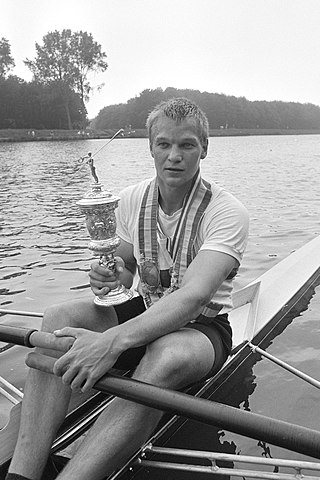
The men's single sculls competition at the 1992 Summer Olympics in Barcelona was held from 27 July to 1 August at Lake of Banyoles. The event was an open-style, individual rowing event conducted as part of the Rowing at the 1992 Summer Olympics programme. There were 22 competitors from 22 nations, with each nation limited to a single boat in the event. The event was won by Thomas Lange of Germany, the fourth man to successfully repeat as Olympic champion. It was the first appearance of "Germany" since 1936, though German rowers representing the United Team of Germany, West Germany, and East Germany had won 10 medals in 8 Games from 1960 to 1988. Václav Chalupa of Czechoslovakia took silver, that nation's first medal in the men's single sculls. Poland's Kajetan Broniewski earned that nation's first medal in the event since 1960 with his bronze.

The men's single sculls competition at the 1968 Summer Olympics took place at Virgilio Uribe Rowing and Canoeing Course, Mexico. The event was held from 15 to 19 October. There were 17 competitors from 17 nations, with each nation limited to a single boat in the event. The event was won by Jan Wienese of the Netherlands, with Jochen Meißner of West Germany taking silver and Alberto Demiddi of Argentina earning bronze. It was the first medal in men's single sculls for each of the three nations. The Soviet Union's four-Games winning streak in the event ended; three-time champion Vyacheslav Ivanov was left off the team in favor of Viktor Melnikov; Melnikov finished fourth in his semifinal and did not reach the main final.

The men's single sculls rowing competition at the 1980 Summer Olympics took place at Krylatskoye Sports Complex Canoeing and Rowing Basin, Moscow, Soviet Union. The event was held from 20 to 27 July. There were 14 competitors from 14 nations, with each nation limited to a single boat in the event. The event was won by Pertti Karppinen of Finland, his second of three consecutive victories from 1976 to 1984. Karppinen was the eighth man to win multiple medals in the event. Silver went to Vasil Yakusha of the Soviet Union, the nation's sixth medal in eight Games. East Germany took a third consecutive bronze medal, all by different rowers as Peter Kersten was the nation's men's single sculler this Games.

The men's single sculls competition at the 1988 Summer Olympics took place at Misari Regatta, South Korea. The event was held from 19 to 24 September. It was the 20th appearance of the event, which had been held at every Olympic Games since the introduction of rowing in 1900. NOCs were limited to one boat apiece; 22 sent a competitor in the men's single sculls. Thomas Lange of East Germany won the event, denying Pertti Karppinen a record fourth-straight win and starting a two-Games winning streak of his own. Peter-Michael Kolbe of West Germany took his third silver, joining Karppinen and Vyacheslav Ivanov as three-time medalists in the event. New Zealand earned its first medal in the event since 1920, with Eric Verdonk taking bronze.
The women's double sculls competition at the 1992 Summer Olympics took place at took place at Lake of Banyoles, Spain.
The women's double sculls competition at the 1984 Summer Olympics took place at took place at Lake Casitas, California, United States of America. The event was won by Romanians Marioara Popescu and Elisabeta Lipă ; it was the first of Lipă's 5 Olympic gold medals.
The men's double sculls competition at the 1988 Summer Olympics took place at took place at Han River Regatta Course, South Korea.
The women's double sculls competition at the 1976 Summer Olympics took place at Notre Dame Island Olympic Basin, Canada. It was the first time the event was contested for women.
The women's quadruple sculls competition at the 1976 Summer Olympics took place at Notre Dame Island Olympic Basin, Canada. It was the first time the event was contested for women.
The women's single sculls competition at the 1988 Summer Olympics took place at took place at Han River Regatta Course, South Korea.
The women's quadruple sculls competition at the 1988 Summer Olympics took place at took place at Han River Regatta Course, South Korea.
The women's coxed four competition at the 1988 Summer Olympics took place at took place at Han River Regatta Course, South Korea.
The women's eight competition at the 1988 Summer Olympics took place at took place at Han River Regatta Course, South Korea.
The men's double sculls competition at the 1992 Summer Olympics took place at took place at Lake of Banyoles, Spain.
The men's quadruple sculls competition at the 1992 Summer Olympics took place at took place at Lake of Banyoles, Spain.
The women's single sculls competition at the 1992 Summer Olympics took place at took place at Lake of Banyoles, Spain.
The women's quadruple sculls competition at the 1992 Summer Olympics took place at took place at Lake of Banyoles, Spain.
The women's quadruple sculls competition at the 1996 Summer Olympics in Atlanta, Georgia took place at Lake Lanier.

The men's double sculls event at the 2020 Summer Olympics took place from 23 to 28 July 2021 at the Sea Forest Waterway. 26 rowers from 13 nations competed.

The women's double sculls event at the 2020 Summer Olympics is scheduled took place from 23 to 28 July 2021 at the Sea Forest Waterway. 26 rowers from 13 nations competed.




